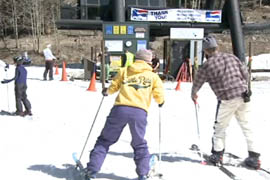Cronkite News has moved to a new home at cronkitenews.azpbs.org. Use this site to search archives from 2011 to May 2015. You can search the new site for current stories.
Federal court rejects challenge to Arizona Snowbowl’s mountain snow-making plan
WASHINGTON – A federal appeals panel Thursday upheld a lower court’s ruling that Arizona Snowbowl can use reclaimed water to make snow on federal land at the Flagstaff ski resort.
A three-judge panel of the 9th U.S. Circuit Court of Appeals rejected a challenge by the Save the Peaks Coalition and several individuals, saying they had “grossly abused the judicial process.” The court said the suit was “virtually identical” to one that had been rejected just months earlier by the U.S. Supreme Court, was presented by the same attorney and included plaintiffs who “actively encouraged” the first suit.
“The ‘new’ plaintiffs … brought certain environmental claims that were virtually identical to some that the attorney had improperly attempted to raise in the earlier lawsuit for no apparent reason other than to ensure further delay and forestall development,” the appeals court ruling said.
But attorney Howard Shanker denied that the latest suit was related to the previous case, which was pressed by the Navajo Nation against Snowbowl and the U.S. Forest Service. He called the court’s ruling Thursday “terrible” and “outrageous.”
“The plaintiffs in this case are unrelated” to the Navajo Nation suit, the Tempe-based attorney said. “If you have completely unrelated plaintiffs, whether they knew about the prior litigation or not, it doesn’t really matter.”
A representative for Arizona Snowbowl could not be reached Thursday to comment on the ruling.
It is the latest turn in a case that began in 2000, when Snowbowl started planning for artificial snow-making at the ski resort. Without snow-making ability, the court said, the resort could be in danger of shutting down because of the inconsistent snowfall in the region and the effect that has on skiing conditions and annual profits.
The Forest Service in 2004 approved Snowbowl’s request to use reclaimed water from Flagstaff for snow-making, after analyzing the quality of the water and possible health effects of ingesting snow made from it.
But eight years later, Snowbowl’s ski runs have yet to be covered with man-made snow.
Opponents, led by the Navajo Nation, sued to block the 2004 approval, arguing that it was not sufficiently strict under national environmental regulations and that it violated the Religious Freedom Restoration Act.
After several years of court battles, the full 9th Circuit Court rejected those claims and in 2009 the Supreme Court refused to consider the case.
Months later, in September 2009, the Save the Peaks Coalition suit was filed, arguing that the Forest Service did not fully address the health and environmental risks of the use of reclaimed water, as required by the National Environment Protection Act.
A U.S. District Court judge in Arizona rejected the second suit. The appeals court upheld that decision Thursday.
The appellate opinion said the Forest Service and Snowbowl “had good reason to believe that the issues involved in the case had been fully and fairly litigated, and that their legal nightmare had ended. Little did they know what awaited them.”
It said the second suit was “a second bite at the apple” for the Navajo Nation “through their surrogates, the Save the Peaks plaintiffs.”
But Shanker said his latest clients, at Save the Peaks, were never required to “hop on board” a previous lawsuit. He could not say whether they would appeal the latest court ruling in the case.
“If there is any gross abuse of the judicial process, it is reflected in the inconsistency of the panel decisions,” he said in an email.







